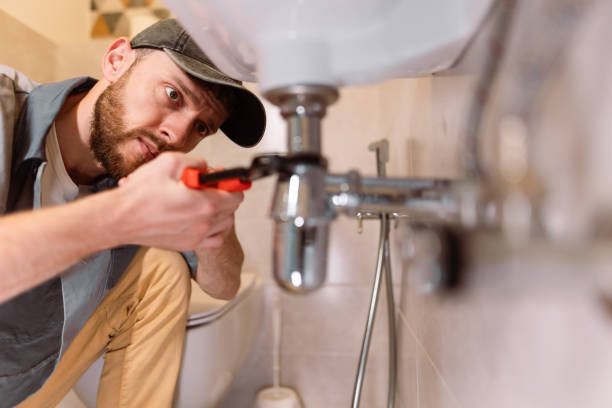Are you considering a career as a plumber? Plumbing is a highly skilled trade that offers stability, good earning potential, and the satisfaction of knowing you’re helping people with their essential needs. In this in-depth guide, we’ll take you through the journey of becoming a plumber, covering everything from the necessary education and training to the skills you’ll need to excel in the field. Let’s dive right in.
Page Contents
what is plumbing
Plumbing is an essential service that keeps our homes and businesses functioning smoothly. From fixing leaky faucets to installing complex piping systems, plumbers play a crucial role in maintaining our infrastructure. If you’re interested in pursuing a rewarding career as a plumber, this guide will walk you through the steps you need to take.
Education: Laying the Foundation
High School Preparation
Your journey to becoming a plumber begins in high school. While a formal education isn’t mandatory, taking relevant courses can provide a strong foundation. Consider enrolling in math, science, and shop classes to develop essential skills.
Vocational Training
After high school, many aspiring plumbers choose to attend vocational schools or community colleges. These programs offer hands-on training and classroom instruction, covering topics such as plumbing systems, codes, and safety regulations.
Apprenticeship Programs
One of the most common paths to becoming a plumber is through an apprenticeship. These programs typically last four to five years and involve on-the-job training under the supervision of experienced plumbers. Apprentices earn while they learn, gaining practical skills and valuable experience.
Licensing and Certification: Becoming a Qualified Plumber
Journeyman License
To work as a plumber independently, you’ll need to obtain a journeyman license. Licensing requirements vary by location, but they generally include passing an exam and completing a specified number of work hours.
Master Plumber Certification
For those looking to advance their careers, becoming a master plumber is the next step. This certification requires additional education and experience. Master plumbers can take on more complex projects and often run their own plumbing businesses.
Essential Skills: What It Takes to Succeed
Technical Proficiency
Plumbers need a strong understanding of plumbing systems, including pipes, fixtures, and appliances. They must be skilled in installation, maintenance, and repair work.
Problem-Solving
Plumbing issues can be complex. Plumbers need excellent problem-solving skills to diagnose issues and find effective solutions quickly.
Communication
Interacting with clients and explaining plumbing problems and solutions clearly is crucial. Effective communication builds trust and ensures customer satisfaction.
Physical Fitness
The job can be physically demanding, requiring plumbers to lift heavy materials and work in tight spaces. Good physical fitness is essential for success.
Safety First: Prioritizing Safety on the Job
Safety is paramount in the plumbing profession. Plumbers work with potentially hazardous materials and tools, so following safety protocols is non-negotiable. Always use protective gear and adhere to safety guidelines.
Job Outlook and Earnings
Job Outlook
The demand for plumbers remains steady, with new construction projects and the need for maintenance and repairs ensuring a constant need for plumbing services. If you’re in need of plumbing services in Maidstone, you can visit here a reputable Plumber Maidstone .
Earnings Potential
The earning potential for plumbers is promising. Income varies based on location and experience, but many plumbers enjoy a comfortable income with opportunities for growth.
FAQs
Q: What’s the typical duration of a plumbing apprenticeship?
A: Plumbing apprenticeships usually last four to five years, during which you’ll receive both classroom and on-the-job training.
Q: Do I need a college degree to become a plumber?
A: No, a college degree isn’t required, but completing vocational training or an apprenticeship is necessary.
Q: Are there opportunities for career advancement in plumbing?
A: Yes, with experience and additional certifications, you can become a master plumber, start your own business, or specialize in specific areas of plumbing.
Q: Is plumbing a physically demanding profession?
A: Yes, plumbing can be physically demanding, so being in good physical shape is important for success.
Q: What’s the job outlook for plumbers?
A: The demand for plumbers is expected to remain steady, offering job security and opportunities for those in the field.
Q: How much can I expect to earn as a plumber?
A: Plumbers’ earnings vary by location and experience, but many enjoy a stable income with the potential for growth.
Conclusion
Becoming a plumber is a rewarding career choice that offers stability, good earning potential, and the satisfaction of knowing you’re making a valuable contribution to your community. By following the educational and training paths outlined in this guide and honing your skills, you can embark on a successful journey toward becoming a skilled plumber.
Whether you’re just starting your journey or considering a career change, plumbing offers a bright future filled with opportunities. So, don’t hesitate to take the plunge and explore the world of plumbing!

Lois Lane is a professional blogger and a seasoned Content writer for wellhousekeeping.com. With a passion for simplifying complex Home Decor topics, he provides valuable insights to a diverse online audience. With four years of experience, Lois has polished his skills as a professional blogger.




